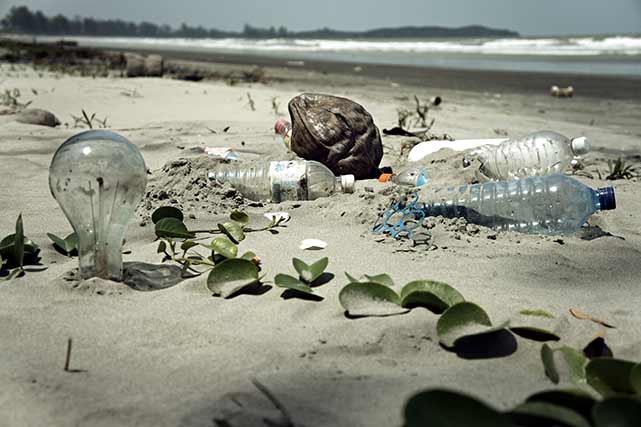More plastic in our oceans than we thought
A new study published in the journal, PLOS One, has found that the amount of plastic in the world’s oceans is far more than scientists had previously estimated. The study found 5 trillion pieces of plastic in the world’s oceans ranging from the size of a grain of salt to larger than a plastic water bottle, TakePart reported yesterday. After spending tens of thousands of hours collecting plastic between 2007 and 2012, the 5 Gyres Institute found that that the plastic weighs more than all of the gold ever mined in the world. “Only two or three generations have been using plastic materials. This provides evidence that the current model of managing plastic materials is economically and ecologically unsustainable,” said Andrés Cózar, a professor at the University of Cádiz in Spain.
U.K. energy minister calls for stranded assets disclosure
Britain’s energy and climate change secretary Ed Davey has called for changes to the country’s financial rules that will require companies to disclose their investments in fossil fuels. “We are seeing a move from carbon capitalism to climate capitalism,” the minister commented on the sidelines of the UN climate negotiations wrapping up in Lima this week. Investors deserve to know whether their holdings are at risk due to stranded assets, Davey told the Guardian. Fossil fuel assets could become stranded if they cannot be burned due to climate change regulations that limit emissions. This idea is not new but has been gaining momentum as more institutions, such as the Bank of England, are beginning to take the matter seriously.
BP cutting costs, cutting jobs
British Petroleum announced yesterday that it is set to cut hundreds of jobs globally by the end of next year. The company is undergoing a $1 billion restructuring program following steep drops in oil prices, The Globe and Mail reported yesterday. Over the next five quarters, most of this money will go towards reducing staff redundancies in all areas of its operations, including oil exploration, production, refining, trading and administration. This is part of a wider attempt in recent years to cut the company’s costs. BP has already sold $43 billion worth of its assets to cover the costs of the 2010 Gulf of Mexico oil spill, as well as other rising costs in the industry.
Unexpected news from the climate negotiations in Lima
The Australian government surprised onlookers yesterday by pledging $200 million over four years to the United Nations Green Climate Fund, helping the fund reach its symbolic goal of $10 billion. The announcement signals a reversal of Australian Prime Minister Tony Abbott’s previous decision not to support the fund.
While money is steadily coming in to help countries deal with the effects of climate change, the climate negotiations in Lima have created more carbon emissions than any other climate summit thus far. While this will be first UN climate summit to neutralize all of its greenhouse gas emissions, more than 50,000 metric tons of carbon dioxide will be released into the atmosphere by the time the summit ends. This is largely due to the fact a temporary structure had to be built for the event and is being powered exclusively by diesel generators.
A U.S. climate delegate confirmed in a news conference yesterday that there is no emissions agreement underway between the U.S. and India. India’s emissions are still below the world average and is in a different economic situation from China, which puts less pressure on the Indian government to take action, Reuters reported yesterday.
Norway’s sovereign wealth fund to keep oil shares
A panel of experts advising Norway’s Finance Ministry has advised the country’s massive sovereign wealth fund to continue investing the country’s oil revenues in fossil fuels. Six experts were selected by the government earlier this year to respond to pressure from opposition parties to divest the fund’s holdings from companies that extract coal. A recommendation supporting divestment would have added to the pressure from environmental groups to persuade university endowments and other organizations to sell their stocks, the New York Times reported yesterday. Corporate Knights’ managing editor Jeremy Runnalls talked to Martin Skancke, the architect of the sovereign wealth fund, earlier this month.
- CK Staff
- CK Staff
- CK Staff
- CK Staff
- CK Staff
- CK Staff
- CK Staff
- CK Staff
- CK Staff
- CK Staff
- CK Staff
- CK Staff
- CK Staff
- CK Staff
- CK Staff
- CK Staff
- CK Staff
- CK Staff
- CK Staff
- CK Staff
- CK Staff
- CK Staff
- CK Staff
- CK Staff
- CK Staff
- CK Staff
- CK Staff
- CK Staff
- CK Staff
- CK Staff
- CK Staff
- CK Staff
- CK Staff
- CK Staff
- CK Staff
- CK Staff
- CK Staff
- CK Staff
- CK Staff
- CK Staff
- CK Staff
- CK Staff
- CK Staff
- CK Staff
- CK Staff
- CK Staff
- CK Staff
- CK Staff
- CK Staff
- CK Staff
- CK Staff
- CK Staff
- CK Staff
- CK Staff
- CK Staff
- CK Staff
- CK Staff
- CK Staff
- CK Staff
- CK Staff
- CK Staff
- CK Staff
- CK Staff
- CK Staff
- CK Staff
- CK Staff
- CK Staff
- CK Staff
- CK Staff
- CK Staff
- CK Staff
- CK Staff
- CK Staff
- CK Staff
- CK Staff
- CK Staff
- CK Staff
- CK Staff
- CK Staff
- CK Staff
- CK Staff
- CK Staff
- CK Staff
- CK Staff
- CK Staff
- CK Staff
- CK Staff
- CK Staff
- CK Staff
- CK Staff
- CK Staff
- CK Staff
- CK Staff
- CK Staff
- CK Staff
- CK Staff
- CK Staff
- CK Staff
- CK Staff
- CK Staff
- CK Staff
- CK Staff
- CK Staff
- CK Staff
- CK Staff
- CK Staff
- CK Staff
- CK Staff
- CK Staff
- CK Staff
- CK Staff
- CK Staff
- CK Staff
- CK Staff
- CK Staff
- CK Staff
- CK Staff
- CK Staff
- CK Staff
- CK Staff
- CK Staff
- CK Staff
- CK Staff
- CK Staff
- CK Staff
- CK Staff
- CK Staff
- CK Staff
- CK Staff
- CK Staff
- CK Staff
- CK Staff
- CK Staff
- CK Staff
- CK Staff
- CK Staff
- CK Staff
- CK Staff
- CK Staff
- CK Staff
- CK Staff
- CK Staff
- CK Staff
- CK Staff
- CK Staff
- CK Staff
- CK Staff
- CK Staff
- CK Staff
- CK Staff
- CK Staff
- CK Staff
- CK Staff
- CK Staff
- CK Staff
- CK Staff
- CK Staff
- CK Staff
- CK Staff
- CK Staff
- CK Staff
- CK Staff
- CK Staff
- CK Staff
- CK Staff
- CK Staff
- CK Staff
- CK Staff
- CK Staff
- CK Staff
- CK Staff
- CK Staff
- CK Staff
- CK Staff
- CK Staff
- CK Staff
- CK Staff
- CK Staff
- CK Staff
- CK Staff
- CK Staff
- CK Staff
- CK Staff
- CK Staff
- CK Staff
- CK Staff
- CK Staff
- CK Staff
- CK Staff
- CK Staff
- CK Staff
- CK Staff
- CK Staff
- CK Staff
- CK Staff
- CK Staff
- CK Staff
- CK Staff
- CK Staff
- CK Staff
- CK Staff
- CK Staff
- CK Staff
- CK Staff
- CK Staff
- CK Staff
- CK Staff
- CK Staff
- CK Staff
- CK Staff
- CK Staff
- CK Staff
- CK Staff
- CK Staff
- CK Staff
- CK Staff
- CK Staff
- CK Staff
- CK Staff
- CK Staff
- CK Staff
- CK Staff
- CK Staff
- CK Staff
- CK Staff
- CK Staff
- CK Staff
- CK Staff
- CK Staff
- CK Staff
- CK Staff
- CK Staff
- CK Staff
- CK Staff
- CK Staff
- CK Staff
- CK Staff
- CK Staff
- CK Staff
- CK Staff
- CK Staff
- CK Staff
- CK Staff
- CK Staff
- CK Staff
- CK Staff
- CK Staff
- CK Staff
- CK Staff
- CK Staff
- CK Staff
- CK Staff
- CK Staff
- CK Staff
- CK Staff
- CK Staff
- CK Staff
- CK Staff
- CK Staff
- CK Staff
- CK Staff
- CK Staff
- CK Staff
- CK Staff
- CK Staff
- CK Staff
- CK Staff
- CK Staff
- CK Staff
- CK Staff
- CK Staff
- CK Staff
- CK Staff
- CK Staff
- CK Staff
- CK Staff
- CK Staff
- CK Staff
- CK Staff
- CK Staff
- CK Staff
- CK Staff
- CK Staff
- CK Staff
- CK Staff
- CK Staff
- CK Staff
- CK Staff
- CK Staff
- CK Staff
- CK Staff
- CK Staff
- CK Staff
- CK Staff
- CK Staff
- CK Staff
- CK Staff
- CK Staff
- CK Staff
- CK Staff
- CK Staff
- CK Staff
- CK Staff
- CK Staff
- CK Staff
- CK Staff
- CK Staff
- CK Staff
- CK Staff
- CK Staff
- CK Staff
- CK Staff
- CK Staff
- CK Staff
- CK Staff
- CK Staff
- CK Staff
- CK Staff
- CK Staff
- CK Staff
- CK Staff
- CK Staff
- CK Staff
- CK Staff
- CK Staff
- CK Staff
- CK Staff
- CK Staff
- CK Staff
- CK Staff
- CK Staff
- CK Staff
- CK Staff
- CK Staff
- CK Staff
- CK Staff
- CK Staff
- CK Staff
- CK Staff
- CK Staff
- CK Staff
- CK Staff
- CK Staff
- CK Staff
- CK Staff
- CK Staff
- CK Staff
- CK Staff
- CK Staff
- CK Staff
- CK Staff
- CK Staff
- CK Staff
- CK Staff
- CK Staff
- CK Staff






